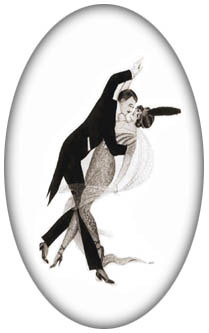 |

Plots gone
wrong
Perhaps the
best way to catch the rhythm of Patrick O’Connor’s studies would
be to hit the dance floor and do the tango. Dipping and turning
through recent academic interpretations of the classic Argentine
steps, O’Connor, an assistant professor in romance languages and
literatures and the College, comes to rest on his own: The tango,
with its exaggerated, suggestive moves, represents a perversion
of heterosexuality. Identifying and interpreting such perversions,
which O’Connor defines as “accepting conventional ideas of what
human development should be but stubbornly departing from them anyway,”
lie at the heart of his current research, featured in his Humanities
Open House lecture last year on Eva Perón and the tango. As a resident
fellow at the University’s Chicago Humanities Institute next year,
O’Connor, 40, will take a sabbatical during the winter and spring
quarters to write a book on the manifestations of the perverse in
Latin American fiction, a topic that combines his literary studies
of gay and lesbian issues, fetishism, and Latin American culture.
In Paper
Dolls: Latin American Fiction and the Narratives of the Perverse,
O’Connor will analyze the significance of sexually perverse heterosexual
and homosexual characters in a swath of Latin American novels. O’Connor
says he’s fascinated by the lives of characters in which “the plots
go wrong.” His subjects include Molina, the gay window dresser in
Kiss of the Spider Woman, who seduces his heterosexual cell mate
in an Argentine prison; the rich Uruguayan in The Daisy Dolls who
commissions a life-size doll named for and resembling his wife,
eventually falling in love with the doll, cheating on it with another
female doll, and finally going mad; and the young Cuban poet in
Paradiso who justifies his homosexuality to himself by imagining
his father performing homosexual acts as an adolescent. O’Connor
says he may also include a chapter on Perón and “tacky representations”
of her, such as Madonna’s portrayal in the screen adaptation of
the musical Evita, in which, O’Connor points out, Madonna and costar
Antonio Banderas try to pass off a tango waltz as the real tango
in the movie’s climactic scene.
As he explores
these and other characters, O’Connor, who holds a Ph.D. from Yale,
says he does not want to be “a literary historian who stands at
a distance from a shelf of Great Books and says what the history
of Latin American fiction should be,” but, rather, one who “gets
down on the page where a character is doing something you wouldn’t
expect and then sits down and looks at that moment’s relationship
to the rest of the book.” O’Connor says he chose the title Paper
Dolls to allude to The Daisy Dolls by Felisberto Hernández and to
Paper Tigers, a book of literary criticism by John Sturrock on the
work of Jorge Luis Borges. The overall purpose of the project, O’Connor
says, is to challenge traditional approaches to Latin American literature.
In one new
take, O’Connor interprets the works through the prism of Freudian
categories. “Freud is good to apply, because Latin American critics
tend not to use him themselves,” says O’Connor. “The more common
way is to apply anthropological or Marxist language to the study
of Latin American culture. But Freud’s narratives tell us a lot
about what kind of a story about sexuality sounds plausible.
O’Connor also
argues for a literary history of Latin American fiction that places
at its center a work like Manuel Puig’s Kiss of the Spider Woman.
Most literary circles, he explains, tend to use as their standard
Gabriel García Márquez’ One Hundred Years of Solitude, a
sweeping family drama acclaimed for its use of magical realism and
grounded in traditional Latin American themes relying on fear of
incest and depictions of the region as a vast jungle. By setting
up Solitude as “the norm” for Latin American fiction, O’Connor suggests,
critics are marginalizing works that speak with comparable eloquence
about the region’s urban life and that create equally complex—though
perhaps less traditional—characters.
“I hope people
will take away from the book the idea that you have to keep the
same kind of critical distance from Solitude that you would from
a statistically normal definition of sexuality,” O’Connor says.
“There are other histories to be told. There can be a lot more excitement
in books that seem perverse or twisted than in grand epics that
reinforce limiting notions of the Latin American char-acter.”—C.S.
|



